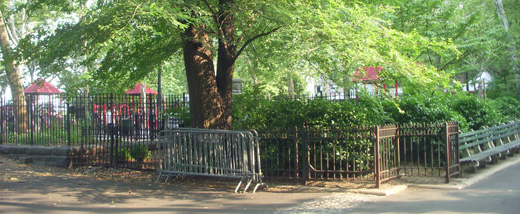
The pleasures of reading Barbara Pym’s A Glass of Blessings are simple but amply sustaining. There is the lapidary writing, marinated in understatement, and a corresponding tact: Pym has very clear ideas about what’s right, what’s wrong, and what’s funny, but she is determined to avoid communicating them directly to her readers, some of whom, she trusts, will share her outlook without having to be cued. (Those who don’t will either be bored, puzzled, or — the lucky ones — intrigued.) You know that you’re going to be a fan of Pym’s artistry if the following exchange elicits not a laugh but a broadening smile:
“I don’t like knitting,” I said.
“No, I despise women who are always knitting,” said Sybil. “But it can be a useful occupation — the kind of thing one can do when talking.”
“I wonder if women brought their knitting when Oscar Wilde talked,” said Piers.
“I daresay not,” said Sybil calmly, “but that doesn’t mean they wouldn’t have liked to.”
There is the handsome figure of Wilmet Forsyth, the young married lady of modest leisure who narrates the book, along with the delightful suggestion that Wilmet is something of an unreliable narrator. It’s not that she has something to hide, but rather that she has something to learn. Her lesson is bound up in the poem that gives the book its title.
In George Herbert’s four-stanza, sixteen-line poem The Pulley, God pours the contents of a glass of blessings over newly-created man. Having bestowed strength, beauty, wisdom, honor, and pleasure, God holds back on the blessing at the bottom of the vessel, which is that of rest, so that the other virtues will be enjoyed “with repining restlessness.”
Let him be rich and weary, that at least;
If goodness lead him not, yet weariness
                May toss him to my breast.
Wilmet Forsyth does not repine, but she is restless, and the novel opens with a double-barreled temptation. At church one morning, she spies the brother of her best friend, an interesting disappointment called Piers. Then, after the service, she learns that a new assistant priest will be arriving soon. Ingenuously unaware of the dangers to her heart as well as to her respectability, Wilmet dallies flounderingly with both men. As it happens, they’re both, while fond of her — fond perhaps because she is married and unattainable — interested in other people. At the end of the novel, Wilmet realizes that her life is indeed as blessed as it can be. (That her staid-seeming husband, Rodney, has also found his attentions wandering serves to strengthen the marriage, but it also helps that his mother, Sybil, decides to remarry, and to reclaim her house for herself, forcing the young couple to do what they ought to have done at the start.)
There is the pleasure of Pym’s ecclesiastical comedy. Three sorts of players occupy this uniquely English stage: the high-church clergymen, addressed as “Father,” the respectable ladies of the parish who expect the clergymen to remain celibate, and the laymen who bring to the more elaborate liturgies an expertise that savors more of military competence and commercial savvy than of spiritual piety. It is an utterly worldly church that is, pre-eminently, the hub of its parishioners’ lives, which unspool not in some charming county village but in what seems to be Bayswater. It might strike today’s reader as odd that a moderately fashionable and respectable young married woman, without children, plans her life around morning mass and parish receptions, but it would be a mistake to suppose that Wilmet is less religious than the churchgoers around her. Almost as though the Reformation had never happened, these people regard the church as a fount of meaning and familiarity. They have little interest in the doctrinal underpinnings, and rather expect the church to act as a buffer that protects the everyday from the transcendent.
There is also the pleasure of watching a lady novelist handle gay life candidly, at a time when homosexual acts were proscribed in England, and to do it without resorting to any simplifying terminology. When Wilmet divines that Keith, Piers’ beautiful but socially inferior flatmate, is more than a friend, she absorbs the blow to her vanity without a drop of nasty moralizing.Â
I got into the taxi and we waved goodbye. I could not imagine Piers going back to the house, climbing the stairs, perhaps sitting down heavily in an armchair, letting out an exaggerated sigh, while Keith’s flat little voice began discussing me, criticizing my clothes and manner. I felt battered and somehow rather foolish, very different from the carefree girl who had set out across the park to meet Piers. But I was not a girl. I was a married woman, and if I felt wretched it was no more than I deserved for having let my thoughts stray to another man. And the ironical thing was that it was Keith, that rather absurd little figure, who had brought about the change I thought I had noticed in Piers and which I had attributed to my own charms and loving care!
Also rather gay is Wilfrid Bason, a reject from Rodney’s office who serves the parish priests as a housekeeper for a while. He’s a very sophisticated cook, but he’s also something of a thief — at least, he likes to borrow other people’s pretty things. That’s the extent of Bason’s outrageousness, but given this novel’s mild climate, he fairly screams his way through it. Pym shows him off as a ridiculous person, but without the faintest suggestion that he’s representative of his team.
Finally, there is the benediction of Pym’s great good nature. In a conventional novel, the following passage might adorn the expository beginnings, but in A Glass of Blessings it works rather more like a climax.
I tried to make myself useful but there was very little for me to do. The weather was glorious, but it seemed wanton to be lying in a deckchair in the mornings while Mary was arranging things for the coming retreat, so I took an upright canvas chair, or sat on a hard wooden seat of the kind that looks as if it might have been given in memory of someone. I half expected to see an inscription carved on the back. The only task Mary could find for me was to pick and shell some peas for lunch, and to put the pods on the compost heap under the apple trees at the bottom of the garden. Here, in a kind of greenish twilight, stood a pile of grass cuttings and garden rubbish, and as I added my pods to it I imagined all this richness decaying in the earth and new life springing out of it. Marvell’s lines went jingling through my head.
My vegetable love should grow
Vaster than Empires and more slow….
There seemed to be a pagan air about this part of the garden, as if Pan — I imagined him with Keith’s face — might at any moment come peering through the leaves. The birds were tame and cheeky, and seemed larger than usual; they came bumping and swooping down, peering at me with their bright insolent eyes, their chirpings louder and more piercing than I had ever heard them. I wondered if people who came here for retreats ever penetrated to this part of the garden. i could imagine the unmarried mothers and the schoolboys here, but not those who were striving to have the right kind of thoughts. Then I noticed that beyond the apple trees there was a group of beehives, and I remembered the old saying about telling things to bees. It seemed that they might be regarded as a kind of primitive confessional.
I went slowly back to the lawn, but to a deckchair now; the hard wooden seat seemed out of keeping with my mood.




